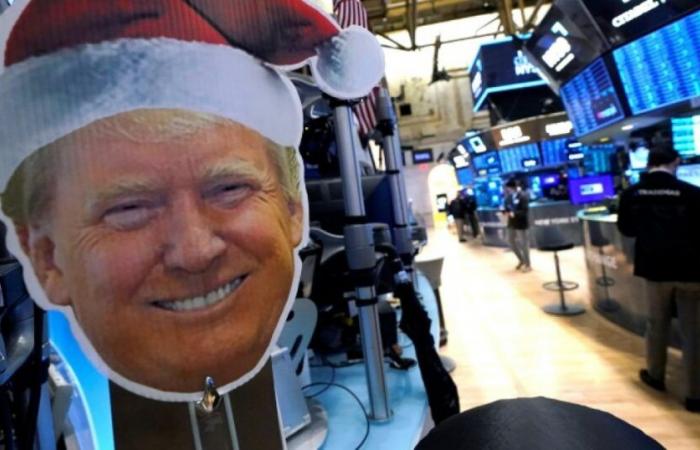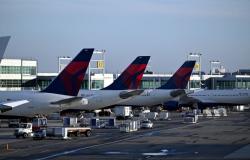Donald Trump, returning to the economic strategy of his first term, reignited concerns about all-out trade wars by threatening China, Canada and Mexico to increase customs duties as soon as he came to power in January.
“On January 20, as one of my many first executive orders, I will sign all the necessary documents to impose 25% tariffs on ALL products entering the United States on Mexico and Canada,” the president wrote on Monday. president-elect on his Truth Social network.
It is on this date that the 78-year-old Republican, comfortably elected on November 5, will take the oath of office.
“This tax will remain in effect until drugs, especially fentanyl, and all illegal immigrants stop this invasion of our country!” he added.
In a separate publication, the 78-year-old billionaire, who had already sparked trade clashes with China and Europe during his first term (2017-2021), announced an increase in customs taxes of 10%, adding to to those already existing and to those additional that he could still decide, on “all the numerous products arriving from China to the United States”.
The reactions were not long in coming.
“No one will win a trade war,” Chinese diplomacy warned on Tuesday.
– “Danger” –
Beijing also firmly rejected Donald Trump's argument regarding opiate trafficking, stating via its embassy in the United States that “the idea that China knowingly authorized the entry of fentanyl precursors into the United States is completely contrary to facts and reality.”
The President of Mexico Claudia Sheinbaum, for her part, wrote to her future Republican counterpart to warn him: “To one customs tariff, another will come in response and so on until we endanger our common enterprises” .
She defended the free trade agreement between Canada, the United States and Mexico, which has been “beneficial in strengthening the North American economy.”
As for Canadian Prime Minister Justin Trudeau, whose relationship with Donald Trump has always been tense, he said on Tuesday that he had had a “good” exchange with the president-elect the day before.
In the neighboring country, where 75% of exports go to the United States, the news sent a shock wave.
“I find his comments unfair. I find it insulting. It's like being stabbed by a family member,” protested the Premier of the province of Ontario, Doug Ford.
“We must prepare for Europe or Germany to be faced with similar situations,” warned German Economy Minister Robert Habeck on Tuesday, reflecting the concern of Europe's largest economy, which is very dependent on its exports.
– “Steal jobs” –
The European Union must “react in a united manner” and “clearly show that everyone is a loser” with these types of American measures.
On the Frankfurt Stock Exchange, the shares of major automobile manufacturers such as Volkswagen and Porsche took the hit on Tuesday morning.
“I want German car companies to become American,” Donald Trump declared during the campaign. “We’re going to steal other countries’ jobs, we’re going to steal their factories.”
Even before taking the oath of office on January 20, the president-elect therefore promises to translate into action two of his major campaign promises, namely to act against illegal immigration while engaging in a standoff with the United States' trading partners, whom he accuses of unfair practices.
Before winning hands down in the presidential election on November 5, he even assured that the increase in customs duties was his “favorite expression”, remaining deaf to the warnings of certain economists on the inflationary potential of such measures.
Last week's appointment as Commerce Secretary of Howard Lutnick, CEO of the investment bank Cantor Fitzgerald and a keen critic of China, had already confirmed the president-elect's desire to try to bend his trading partners to obtain better conditions.
It remains to be seen whether he will carry out his threat on January 20, or whether these resounding declarations are more part of the strategy of the former businessman, inclined to approach diplomatic, political or economic relations in the mode of grip.






